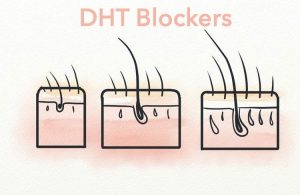 Few medications come without the potential for unwanted side effects. Sometimes those side effects are relatively rare or minor. Other times, those side effects, should they occur, may be so significant that they may outweigh the benefits the medication is supposed to provide. When it comes to hair loss medication, DHT blockers can pose just such a dilemma. While DHT blockers can help reduce hair loss, they can also reduce sexual function in rare instances, which makes the decision to use them a deeply personal and complicated one.
Few medications come without the potential for unwanted side effects. Sometimes those side effects are relatively rare or minor. Other times, those side effects, should they occur, may be so significant that they may outweigh the benefits the medication is supposed to provide. When it comes to hair loss medication, DHT blockers can pose just such a dilemma. While DHT blockers can help reduce hair loss, they can also reduce sexual function in rare instances, which makes the decision to use them a deeply personal and complicated one.
What is DHT?
Dihydrotestosterone, or DHT, is a derivative of testosterone that has been scientifically linked to hair loss. Typically, due to genetics or other hormonal changes, hair follicles develop a sensitivity to DHT and begin to miniaturize. This process shortens the hair growth cycle and eventually causes new hair to stop growing. As such, individuals with elevated DHT levels may be more prone to hair loss.
Reducing DHT levels is what makes Propecia, one of the most popular pharmaceutical hair loss treatments, so effective. Some studies have shown that Propecia can reduce DHT levels by as much as 70%.
What is the Problem With Reducing DHT Levels?
The problem is that DHT does much more than contribute to hair loss. It also plays a crucial role in male sexual development and mood regulation. When DHT levels are reduced, either intentionally or unintentionally, it can impact these functions in unwanted ways and cause:
- Impotence
- Lower sex drive
- Difficulty achieving orgasm
- Abnormal ejaculation
- Gynecomastia (male breast development)
- Depression
Additionally, since DHT blockers like Propecia affect the body’s hormone system, they should not be handled by pregnant women or women who may become pregnant as it may increase the risk of birth defects in male babies.
How Common are the Side Effects of DHT Blockers?
The good news is that that these side effects only appear in a small minority of men (about one out of every hundred) who use DHT blockers such as Propecia. If any issues do develop with sexual functioning, they are almost always temporary and will return to normal after discontinuing the drug.
As with any medication, you should discuss with your hair loss physician whether DHT blockers or other pharmaceutical treatments offer a viable and effective option for addressing your hair loss issues.
Call the Hair Transplant Institute of Miami Today to Schedule Your Personalized Hair Loss Consultation
At the Hair Transplant Institute of Miami, we evaluate each hair loss patient with a comprehensive and proven methodology, obtaining a detailed medical history, performing an in-depth scalp examination using state-of-the art diagnostic tools and, if indicated, blood tests to detect any underlying imbalances or deficiencies that may be contributing to the hair loss problem. With this information, we can determine the cause of hair loss and the most effective treatment option, whether it be medication, hair transplant surgery, or other alternatives.
To schedule your personalized hair loss evaluation, contact us online or call our office directly at 305-925-0222.

